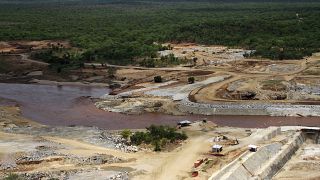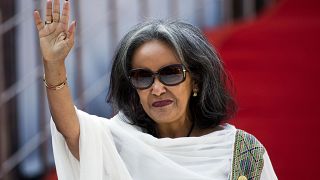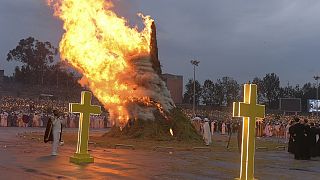Ethiopia
Ethiopia’s security agencies on Thursday arrested dozens of suspects who are thought ton have played a role in a botched coup in northern Amhara state and the murder of the army chief in the capital Addis Ababa.
The weekend attacks have heaped pressure on Prime Minister Abiy Ahmed, already facing waves of ethnic violence which have displaced over two million people, as he pushes forward with democratic and economic reforms.
Spotlight on NaMA party
An ethno-nationalist party in Amhara, one of several political groupings gaining ground as political space opens up, said more than 56 of its members and supporters had been arrested.
“In Addis Ababa alone, 56 of our members and sympathisers have been arrested while dozens other NaMA (National Amhara Movement) sympathisers and members in Oromia have also been arrested,” said party spokesman Christian Tadele.
“The campaign of arrests against NaMa members and sympathisers isn’t just directed against a party, but is also an identity-based attack,” Christian told AFP.
The National Amhara Movement was formed around a year ago as a hardline ethno-nationalist challenger to the Amhara Democratic Party (ADP) — one of the four alliance members in the national ruling party, the EPRDF.
“It is pressing territorial claims on neighbouring Tigray region and asserting that it would stop the ‘persecution’ of Amharas living outside Amhara state,” the International Crisis Group (ICG) said of the party.
The history of Amhara, which has provided Ethiopia with its national language, is a source of pride for many who belong to the country’s second largest ethnic group.
Some there resent the fact the previous federal government was dominated by Tigrayans who make up about 6% of the population – and now the prime minister is an Oromo. Border disputes simmer with neighbouring Oromia and Tigray.
Asaminew Tsige’s ethnic rhetoric
The security chief, Asaminew Tsige, who is accused of orchestrating the two attacks at the weekend, was seen as being appointed to his post in the ADP to appeal to the more hardline residents of the region.
In 2018 he was released from almost a decade in prison over a 2009 coup plot.
He espoused similar views to the NaMa, observers say, and was likely facing dismissal over his fiery rhetoric and efforts to form militia.
Asaminew, who was shot dead on Monday while on the run, is also believed to have co-ordinated the assassination of army chief Seare Mekonnen who was shot dead by his bodyguard on Saturday night.
More attacks
Meanwhile, details emerged Thursday of a bloody attack in neighbouring Benishangul Gumuz state at the hands of what local officials believe are men trained by Asaminew.
Abera Bayeta, head of Benishangul Gumuz regional state peace and security bureau, told AFP that around 100 heavily-armed men had attacked a village at dawn on Monday, “killing more than 50 civilians most of them women and children.”
AFP could not independently verify his claim.
Abera said the perpetrators of Monday’s attack managed to escape, but that 85 others believed to be planning a similar assault were arrested on Thursday.
“We believe the Monday attackers and the 85 armed men we apprehended were both trained by Asaminew Tsige, with the aim to eventually attack neighbouring communities” he said.
Dozens of people have been killed in recent months in clashes between residents of northern Benishangul Gumuz and Amhara states, one of the many hotspots in the country pitting communities against each other, often over land and resources.
Will Abiy’s reforms survive?
Elias Gebru, a civil society activist based in Addis Ababa, said three of his colleagues had been arrested and appeared in court Tuesday on accusations they assisted in the coup bid.
“The Ethiopian government is reverting to its old practices of persecuting peaceful people as an excuse for its internal strife,” said the activist.
The ethnic violence is seen as a backlash to Abiy’s efforts to lead democratic reforms in Africa’s second-most populous nation.
Observers say the prime minister’s breakneck reforms have severely weakened the unity of the once all-powerful EPRDF.
“The world out there wanted to believe the fairy tale. They became obsessed with their own narrative,” said Tamrat Giorgis, the managing editor of the Addis Fortune, a privately-owned English-language newspaper. “But that doesn’t chime with what is happening on the ground. It is much more complex and scary.”
His loosening of the reins in the long-authoritarian state has stirred up ethno-nationalist sentiment in Ethiopia’s nine autonomous regions, which are divided along ethnic lines, and fuelled jockeying for power ahead of 2020 elections.
“Abiy’s reforms removed the lid on many accumulated grievances,” said Rashid Abdi, an independent Horn of Africa analyst. “Making the transition to a more open society is always dangerous.”
Internet services were partially restored across Ethiopia on Thursday after a near-total blackout for the past five days.
Agencies












00:58
Somaliland opposition leader wins presidential poll
11:07
Botswana's new government races to diversify its economy {Business Africa}
01:51
Meet the churches welcoming migrants across the world and championing diversity
Go to video
Ethiopian runner Yomif Kejelcha breaks men's half-marathon world record
01:38
Malaysia, Ethiopia agree to strengthen bilateral ties
00:41
Ethiopian PM Abiy Ahmed meets Putin at BRICS Summit, pushes for stronger trade ties